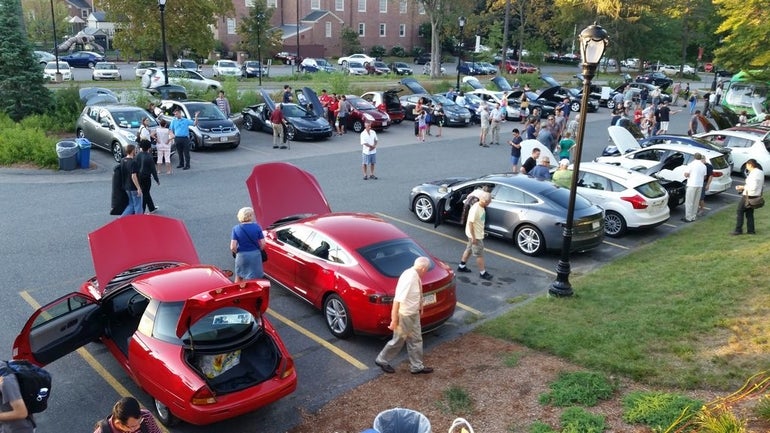Twenty-five percent of vehicles purchased annually by state government must be zero emission vehicles by 2025, under legislation approved by the Massachusetts Senate on Thursday.
The bill (S 2505) also authorizes cities and towns to establish special rules to foster parking opportunities for the operators of electric vehicles, with violators facing penalties of up to $50 and the removal of their vehicles.
In a burst of post-election legislating, the Senate on Thursday passed the bill after it was popped out of the Senate Ways and Means Committee, where it has been sitting since May. “We’ve been working on it for months,” Sen. James Eldridge (D-Acton) told the News Service. “It really is a bill to create more incentives for people to purchase electric cars.”
Eldridge said he hoped the House would approved the bill this month or in December, before the new two-year session begins in January. The Senate tacked the bill onto its omnibus energy legislation earlier this year and during talks with the House it was carved out of the bill that ultimately became law.
Environmental and public health group leaders along with representatives from the Alliance of Automobile Manufacturers, Global Automakers, Nissan, TechNet and Tesla have written to House Ways and Means Committee Chairman Rep. Brian Dempsey urging the House to advance a similar bill, saying only 7,000 electric vehicles have been sold in Massachusetts, which has a commitment to sell 300,000 through 2025. Dempsey was a chief negotiator on the energy bill.
To reduce carbon emissions, public officials are trying to promote charging stations and electric vehicles, which are gradually catching on among consumers who are weighing the cost of such vehicles against costs of traditional gas-powered vehicles.
Asked about his own vehicle, Eldridge said he drives a Pontiac Vibe, which he says gets 34 miles per gallon. He said he hopes to buy a hydrogen fuel cell or electic car the next time he’s in the market for a new vehicle.
Consumers realize savings with electric vehicles over time, said Eldridge, who acknowledged such vehicles are more expensive than gas-powered vehicles. “In Massachusetts you have a lot of consumers that are willing to pay a little bit more to do their part to reduce greenhouse gas emissions,” he said.
A provision of the bill requires Baker administration officials to study the assessment of surcharges or levies to offset the projected loss of gas tax revenues as the market share of zero emission vehicles increases, according to a bill summary. That study would be due by Dec. 1, 2017, under the bill.
The legislation also calls for studies of the electrification of fleets used by regional transit authorities and the possibility of authorizing electric vehicle operators to travel in lanes now restricted to high-occupancy vehicles (HOV). The HOV lane study would be due by Oct 1, 2017, under the bill.
The bill is based on legislation (S 1824) sponsored by Eldridge and Reps. Frank Smizik, Denise Provost and Michelle DuBois. The Transportation Committee reworked and released its version of that bill in May and the Ways and Means Committee on Thursday polled out the latest version of the bill.
Other provisions in the Senate-approved bill deal with price schedules at public electric vehicle charging stations, submitting data to the National Renewable Energy Laboratory, building and electric code standards governing charging stations in residential and commercial buildings, and adoption of interoperability billing standards for network roaming payment methods for electric vehicle charging stations.
Sens. Joseph Boncore (D-Winthrop) and Ryan Fattman (R-Webster) were the only senators present during Thursday’s Senate session.

